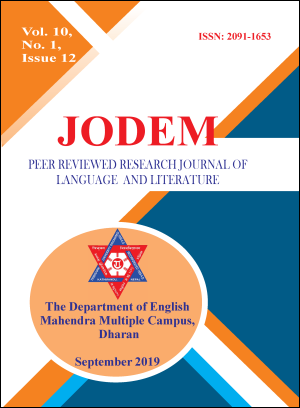Yogmaya: Historical Reality in the Fictional Existence
DOI:
https://doi.org/10.3126/jodem.v10i1.30393Keywords:
Realism, historicism, new historicism, evil customs, women movementAbstract
The aim of this article is to analyze the novel Yogmaya to find out the balance between the fictional world presented in it and the history related to it. Written as a novel on the background of Rana Period in Nepal, my endeavour is to find out whether the novel is successful to portray the contemporary Nepalese society. In order to analyze the novel this study draws insight from new historicism that demands the equal weight for literary foreground and historical background. For this, the study is limited within some aspects of New Historical approach and fictional world related to social phenomena presented in the novel. Finally, this article includes the major finding of this study that the fictional foregrounding of the novel successfully portrays the contemporary social background of the concerned time and place. Free translation is used while citing texts from the novel since it is in Nepali.
Downloads
Downloads
Published
How to Cite
Issue
Section
License
© Department of English, Mahendra Multiple Campus, Dharan, Nepal

